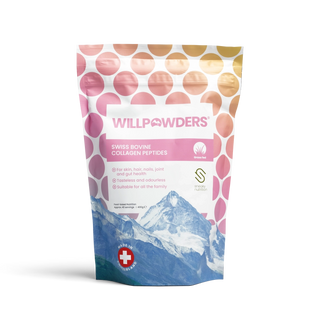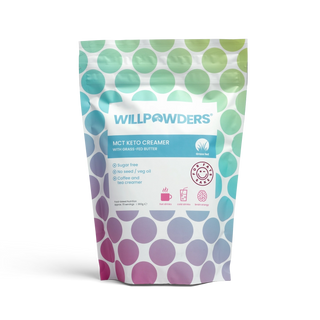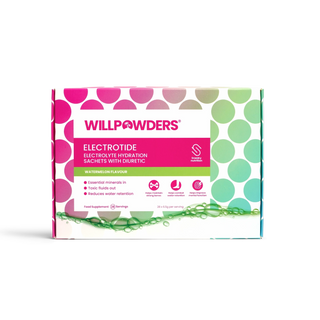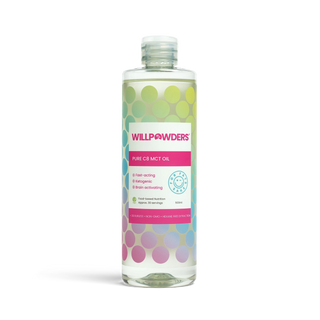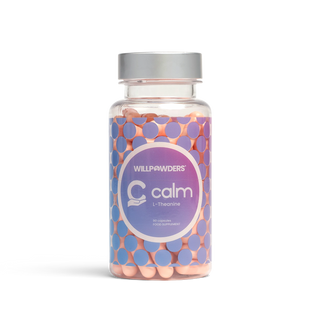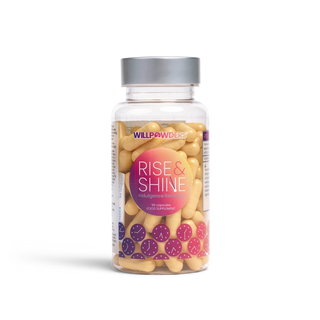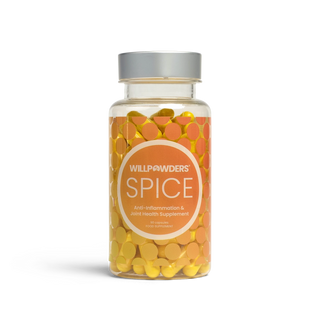
Hack Your Hormones
Cha-cha-kombu-cha: The Way to Happiness Could be Through the Stomach
Research shows the little lives of the bacteria in your gut could be one of the biggest keys to your happiness. So, let’s raise a glass to them and let’s make it a glass of kombucha!
Some things just feel plain old happy making. Thoughts of snow-capped mountains, pure air and new buds of life unfurling are usually somewhere in our psyche’s list of happiness triggers. We also admire when care and attention is paid to the crafting of food and drink, that makes us happy too, especially when we get to savour it on our tongues. If we help others, that can give us a dopamine surge, too. Yippee! Add all those happiness triggers up and you might well arrive at some of the reasons we blended our Fresh, Warm and Light kombuchas, which, alongside other WillPowders Way tools, might just stimulate your happiness centres, particularly your gut-brain axis. Because, as it turns out, there is growing evidence to suggest that what we put in our tummies also plays a role in the way our mood might swing. Yes, the organ that has gut instinct and gut feelings also enjoys a bidirectional relationship with our brains and happy good gut bacteria makes for a happy human.
Glum Nation: Are the wrong bacteria for our tums giving us the doldrums?
The microbiome-gut-brain axis is of interest to scientists, particularly since some statistics suggest that, by 2030, depression could be the most prevalent disease globally amongst humans, which is a depressing thought in itself. What has happened to us all? Well, scientists tell us, ‘Preliminary evidence from observational studies has demonstrated that patients with depression and anxiety disorders have significantly different gut microbiome profiles compared to healthy individuals [*]’. And, it doesn’t just end there because anxiety and stress co-exist in around 75% of cases of depression amongst children and adults alike. So, it’s not just the doldrums that plenty of us are experiencing, but the heebie jeebies as well, all wrapped up in the World of Stressed Eric and Erica. No wonder so many of us are muttering, this is no way to live. The most consistent findings in science so far regarding gut bacteria and depression are that if the pro-inflammatory bacteria are enriched and anti-inflammatory bacteria depleted, then depression is likely to arise [*].
How’s your belly off for bacteria?
Let’s take a look at your gut microbiome - now that’s a sentence we’ve never heard uttered in any medical consultation on low mood. This is despite the fact that, second only to the brain, the gut is the organ in your body that contains the second highest number of neurons. Whereas the brain sits nicely protected from the outside world inside the skull and encased in the dura mater, the Hard Mother, sipping its super filtered blood through the blood-brain-barrier, the gut has to literally brush up against the outside world and get its villi dirty testing to see what’s going on and if it needs to alert the brain. And yet, it's our brains we think we are taking to the doctor for extra care when we have anxiety or depression and the doctor isn’t divesting us of that thinking anytime soon. Don’t get us wrong - with mental health, we need multi-faceted approaches and consulting with a doctor is important. What we are saying is that, meanwhile, eating our way to happy (but we don’t mean by scoffing cake, so put that down!) might be a versatile tool in our toolbox if we’re trying to combat low mood, anxiety or depression. And it might well kick in before the obligatory eight weeks of a serotonin reuptake inhibitor with suggestions of as little as two weeks to improve the gut microbiome being suggested for dysbiosis (when your gut microbiota is off kilter) [*].
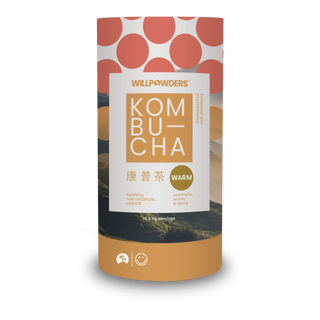
Let’s stop getting stuck in the think, feel, talk and swallow the pill solutions
Pharmaceuticals are at one end of the treatment spectrum for anxiety and depression. In September 2024, NHS data revealed that 6.9 million people in the UK were prescribed antidepressants (antidepressants can also be prescribed to treat anxiety) [*]. This was, once again, an increase in the number prescribed year on year, with the figure having doubled since 2011. If you’ve ever found yourself clutching a prescription for antidepressants once, then, after the doctor has ‘stabilised’ you, aka found your dosage, you’ll probably be clutching repeat prescription after repeat prescription with little interaction with the doc for the foreseeable. Add to this circumstantial evidence that people who have taken a course of antibiotics in the last 5-10 years have later gone on to develop depression, anxiety or even psychosis [*] and we can feel bewildered about which pharmaceuticals are killing or curing us.
You may be offered ‘talk therapy’ which means that the health system claims a ‘multi-faceted’ approach to your mental health.
These can help us with cognitive understanding of our predicament but they won’t cure an underlying cause if it’s your gut that’s off - unless the therapist happens to offer you a live yoghurt! But that’s rare, let’s face it. After the pharma and the talk, for the day to day trudge, it can feel like you’re pretty much on your own. Which is where no one with depression, low mood or anxiety should be.
On top of this, unfortunately, beyond the doctors and the therapists, we live in times where ‘received wisdom’ in regard to low mood prevails. These ‘priceless’ nuggets are wrapped up in the outdated idea that, at best, we should feel and think our way out of it and, at worst, snap out of it. Recall for a moment those strangers who, out of the blue, tell you, cheer up - it might never happen - and you are expected to laugh jovially. Thank goodness they told us! Add to this things like the ubiquitous gratitude journal ‘remedy’ - yet another example of how the discourse around mental health thinks we’ve merely got stuck in our own head. If we see another gratitude journal, we might scream the whole stationery shop down. Equally, suggestions to drop down into your heart chakra can feel like being invited to descend into the lion’s den - it doesn’t feel safe. So, Yogi, begone! Besides, stopping at the heart means we simply haven’t dropped down far enough - science increasingly understands we need to drop our attention to the colonies of bacteria in our gut, shepherd some good ones into the hood then make them feel like royalty by throwing them a banquet. Hoping and wishing we can think, feel or snap our way out of the mental health cul de sac is, at best, only one spoke of the wheel and, at worst, hopeless.
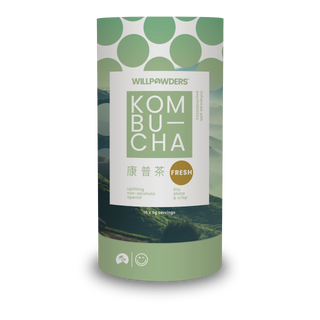
We’re knackered and a bucket of kim-chi doesn’t feel like comfort food
One of the problems with health care systems is that they can treat us like we are robots who just need re-fuelling. We all know that eating better makes us feel better, but, to be quite frank, we’re shagged in terms of having the energy to do it if we are living with anxiety, low mood, stress or depression, or a cocktail of all four. Fermented foods give our good gut bacteria a feast - fantastic! But, find me the person who, when feeling glum, sat down to crunch a comforting box set while crunching a cinema bucket of kim-chi or sauerkraut to boot. It just doesn’t happen, right? Human beings are hedonists - we love pleasure.
So improving your gut microbiome must be a joyous thing in itself.
Firstly, simple, pleasurable modifications to our eating could be a first step to combating low mood and raising our chances of living with moods that we equate with health and happiness. Hell, after a bout of depression or anxiety, living in neutral, never mind contentment would be an improvement. Secondly, knowing that pleasurable steps are achievable helps us to feel empowered that our health is in our hands and stomachs. That, in itself, might begin to interrupt cortisol levels enough to create a gap in the bleak curtain where the light can get in, so to speak.

So, cha-cha-arm our GIs, kombucha!
Easing depression, anxiety and stress is always going to require a multi-faceted approach when we are in the grip of them, but diet should be one of those facets and, going forward, doesn’t it make sense to make a habit of keeping our guts full of happy-making bacteria? Scientists suggest these elements directly or indirectly restore healthy gut microbial composition and diversity [*]:
- Probiotics
- Prebiotics
- Symbiotics
- Postbiotics
Of these, ‘Probiotics are the most studied microbiota-targeting therapies for depression’ [*]. Sip your way to pleasure and feed your good bacteria with WillPowders Kombucha Range. Let’s face it, a nice drink with synbiotics is altogether more appetising than that bucket of kim-chi to go with having a sit down and downshifting the stress. Our Fresh, Warm and Light kombucha powders are packed with health benefits and designed to make friends with your brain and gut. Importantly, they take a moment to mix from the powder because we’ve done the hard work for you. No point in overfacing yourself with faff! They taste amazing and for a full rundown of how these temptresses tickle your palette try here. They don’t contain added sugar or artificial sweeteners so they won’t make a home for gut enemies such as candida yeasts or drown your friendly bacteria in toxins.
WillPowders Probiotics
WillPowders kombuchas contain the probiotic lactobacillus paracasei Lpc-37 which has ‘proven effective in preventing chronic stress-associated behaviours from developing in two recent preclinical experiments of the same model (Stenman et al., 2020)’. It was found that ‘Lpc-37 could reduce the expected increase in physiological markers of stress such as heart rate and blood pressure in response to an acute stress’ and furthermore it was able ‘to normalise the cortisol awakening response and evening cortisol levels, improve psychological test scores both in response to the Trier Social Stress Test and over the study’. Plus, those all important things to help move you towards a happier you, it also demonstrated it could help ‘improve sleep, productivity and overall well-being following a five-week intervention compared to placebo’ [*]. So, all in all, quite good, then!
Since our kombucha powder is encapsulated in fibre, it also acts as a prebiotic to feed the lactobacillus paracasei and the other good bacteria you’ve already got. Additionally, the polyphenols from the oolong and green tea will also act as prebiotics. Since we have pre- and pro- biotic elements in our kombucha, it enters the realm of synbiotics, which is fab because the ‘simultaneous administration of probiotics and prebiotics is believed to improve the activity of beneficial gut bacteria’ [*].
Postbiotics are the molecules that are left after probiotics have been ultra heat treated. We do this at the end of the fermentation process. But, don’t worry, after that, we add in the Lpc-37! But, while it might seem like sacrilege to kill off probiotics, there is increasing evidence that postbiotics might even serve you at least as well, if not better than, probiotics themselves: ‘nonviable bacteria and associated fractions could better traverse through or around mucus and stimulate several cells more consistently than live cells of the same type while also exhibiting similar potential to positively impact health when compared to live cells’ [*]. Equally, as far as The Lancet is concerned, ‘postbiotics offer a promising approach to utilising microbial therapeutics’ for depression.
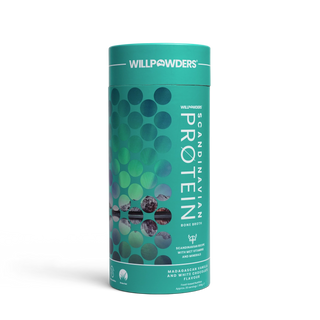
But that’s not all: modify your diet for better gut-brain axis health
The article, Gut Microbiota in Anxiety and Depression: Unveiling the Relationships and Management Options also goes on to suggest:
- Make your diet balanced
- Include fish and omega-3 fatty acids intake
- and there’s a special mention for 5-hydroxytryptophan regulation which is made from tryptophan
If ultra-processed food isn’t part of your week, then you are on the way to building a gut sanctuary for your microbiome. In this way, you get to monitor sugars, and eradicate refined sugar altogether. If you think you are going to miss your sugary, good gut bacteria assassinating snacks, give our yummy WillPowders Protein Powder Range a try to swerve the massacre. Drink it hot or shake it as a cold beverage or twirl through full fat yoghurt - all simple and achievable with a nice sense of teeny ritual about them.
With a diet closer to nature, you also get to say no to bad fats which cause inflammation and free radicals.
You are less likely to be filling yourself with inflammatory foods and so the gut can begin to calm down. Fibre also feeds your gut bacteria so yes, please to fruit and veg. No one at WillPowders will tell you that any of our products replace eating a diet as close to nature as possible. However, we completely know how it feels to want to do better for your health when you have low mood or anxiety but then feel utterly overwhelmed by simple tasks, never mind navigating the Big Food Addiction Emporium that makes up most of the floor coverage of plenty of supermarkets. The idea of shopping better and cooking better is the last thing that you feel you can do when you’re in the throes of depleted mental health. If sipping on a kombucha is what you can manage for the day - then you have nourished you and your gut in one way. Some days, that’s a win.
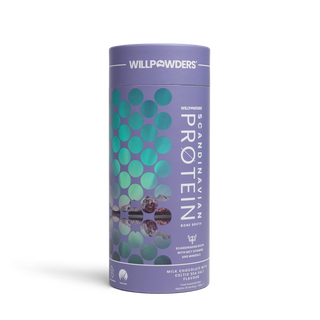
Don't fancy fighting for your food?
If complicated hunter-gathering is a step too far when your mood is low or your anxiety is on the roof, and you are enjoying one of our deliciously cuddly WillPowders Protein Powder Range (chocolate orange, anyone?) then it could be just the tonic with its grass fed butter which has omega 3 for brain health. Not only that but that same grass fed butter brings you butyrates, a short chain fatty acid that has been reported as depleted in patients with major depressive disorder. Scientists found ‘their [short chain fatty acids] administration resulted in antidepressant effects by ameliorating depression-related intestinal permeability’ with the article in The Lancet going on to mention that this is true of butyrates in particular [*]. Hurrah! Plus, it has that vital amino acid tryptophan which means your body will be able to metabolise 5-hydroxytryptophan which will then go on to metabolise serotonin. Did you know that most of your serotonin is manufactured in the gut. Now it’s all beginning to make sense, isn’t it?
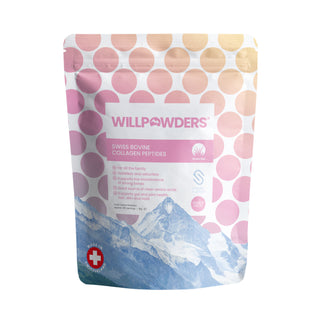
Special mentions go to glycine
At WillPowders, one of our non-negotiables is our award winning WillPowders Hydrolysed Bovine Collagen Peptides for helping heal and keep your gut tickety-boo. Because it’s bovine collagen, it is abundant in the amino acid glycine which, alongside helping the physiology of the gut, it ‘can deliver a strong signal to the brain, likely helping alleviate major depression, anxiety and other mood disorders in some people’ [*]. So, not only will glycine make you an especially good landlord by potentially helping to stop any leaks in your gut wall so that your newly established good bacteria can flourish, it will also be part of your armoury in improving your mood.
Poop doping? You are shitting me!
There’s a final thing on the list that science endorses to promote your gut’s good bacteria but this is where it gets drastic: faecal microbiota transplantation. We say, let’s dial it back and do the simple things with WillPowder tools to start you on the road to good gut health, but we couldn’t resist telling you about the power that gut bacteria has over its host. Faecal microbiota transplantation involves transplanting someone else’s good gut bacteria from their poop into your gastrointestinal tract and, from there, you support the flourishing of the good bacteria, with the aim being to offer the bacteria that are creating your depression far less room at your gut hotel. It may seem extreme, yes, but it has been shown to work in humans and lab mice. One set of mice in the study had been bred to be the happy-go-lucky resilient type and the other set was not. They were kind of like the Eeyore’s of the mouse world. They had been bred for the purposes of study anxiety and depression. Killing the gut bacteria of both sets of mice with a specific antibiotic that acted only on the gut, then introducing the gut bacteria from the mice with the opposite disposition completely swapped the way these mice did life. The happy-go-luckies, you guessed it, became lacklustre and the mice who’d previously been sad had a new lease of life [*]. Dubiously, the practice has been nicknamed poop doping in the world of sport because, it seems, athletic prowess might be achievable in the same way, by dosing yourself with a transplant of an elite athlete's faecal matter. It appears that athletic prowess comes partly from a particular gut microbiome. We think watching them on the TV is as close as we’d like to get to their poop, prowess or no prowess!
Luckily, at WillPowders, we reckon you don’t have to go so far as poop doping to elevate mood, and with a few tweaks to the way you eat and some delicious WillPowders Way tools, you can begin to give your gut the leg up it might well need to help your good gut bacteria flourish.
Further Reading
Gut Microbiota in Anxiety and Depression: Unveiling the Relationships and Management Options makes a great starting point for learning more about the possibility of managing mood through gut microbiota.
For Guilia Enders 'Gut' (not her literal one, obvs, her book) try here.
To read more about how glycine is increasingly linked to better mental health try here.
The Lancet article ‘Gut microbiota and its metabolites in depression: from pathogenesis to treatment’ can be found here.
More Blogs

Kombucha Your Good Self and Get Yourself Good
Sometimes a joyous wellness drink enters your life and changes the way you feel about soft drinks that pack a pun-cha. That’s the way kombucha rolls.

Boost Immunity with Kom'boost'cha!
You heard us right - sipping on a delicious fermented tea could well help you get through winter and beyond with a fortified immune system. When our gut bacteria is...

